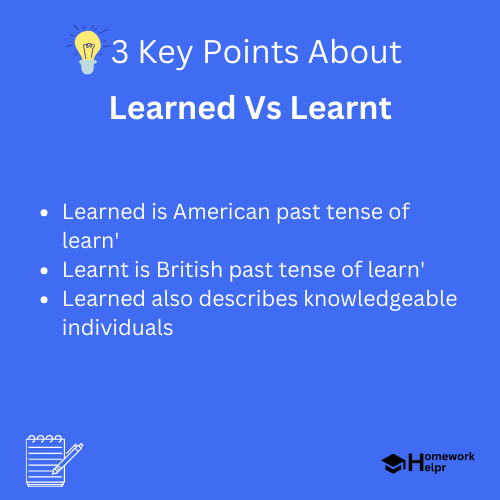📝 Summary
In the English language, the words learned and learnt often create confusion. Learned serves as both an adjective, describing a highly educated person, and the past tense of learn in American English. In contrast, learnt is primarily recognized as the past tense of learn in British English. Understanding the context and cultural differences in usage helps enhance communication skills in both American and British English. Mastering these terms is critical for effective expression. Happy learning!
Learned vs. Learnt: Understanding the Difference
In the world of the English language, there are countless words and phrases that can spark confusion among learners and even native speakers. One such set of words that often baffles people is learned and learnt. Understanding the distinction between these terms is crucial for effective communication. This article will delve into their meanings, usage, and the contexts in which each word is appropriately used.
The Meaning of ‘Learned’
The term learned is an adjective that describes someone who is very educated or knowledgeable in a particular field. For example, we might refer to a learned scholar or a learned professor who has extensive expertise in their area of study.

In addition to its use as an adjective, learned is also the past tense of the verb learn in American English. This means that if you acquired knowledge or skills, you might say, “I have learned about the solar system.” An important aspect of this word is its pronunciation; when used as an adjective, it is pronounced as ‚Äúlur-nid,” while as a verb, it is pronounced ‚Äúlearned.”
Definition
Adjective: A word that describes a noun or pronoun.
Examples
For instance, a learned mentor may guide students through complex subjects.
The Meaning of ‘Learnt’
On the other hand, learnt is considered the past tense of the verb learn in British English. Therefore, when someone from the UK says, “I learnt how to bake a cake yesterday,” they’re using the British form of the past tense.
While it serves the same grammatical purpose as learned, it is important to note that learnt is less commonly used in American English. Many speakers across the pond might feel that the version with ‘t’ sounds more natural and flows better in conversation.
Definition
Past tense: Refers to a form of a verb indicating an action that has already occurred.
Examples
An example could be: “I learnt to swim when I was five years old.”
Usage in Sentences
To further illustrate the differences, let‚’ explore how both terms can be used in context. Here are some examples:
- In British English: ‚ÄúShe had learnt a great deal about history before taking her test.”
- In American English: ‚ÄúHe had learned to play the guitar last summer.”
- Referring to knowledge: ‚ÄúThe learned professor wrote several journals on ancient civilizations.”
These sentences highlight the interchangeable use of the past tense (learnt vs. learned) based on geographical preference, as well as the adoption of learned as a descriptive term.
The Fun of Language Evolution
❓Did You Know?
Did you know that the word “learn” has roots in Old English, where it was spelled “leornian” and meant ‚Äúto get knowledge?”
Cultural Context
Another fascinating aspect of language is how cultural differences influence word choice. For example, British English tends to embrace the simpler forms of past tense while American English prefers the sometimes elongated pronunciations. This cultural distinction enhances the rich tapestry of the English language.
Across the United Kingdom, individuals may express their acquisition of knowledge differently. Similar to how like variations exist in idioms, the choice between learned and learnt often reflects subtle regional preferences.
Conclusion
In conclusion, understanding the difference between learned and learnt is vital for mastering English language nuances. Knowing when and how to use these terms can significantly enhance one‚’ writing and speaking skills. As you navigate through the fascinating world of grammar and vocabulary, keep this distinction in mind. Whether you lean towards American or British English, both terms hold valuable significance in conveying knowledge and experience.
So, the next time you want to talk about what you have learned or learnt, you’ll know exactly how to express it! Happy learning!
Related Questions on Learned Vs Learnt
What does learned mean?
Answer: Learned describes someone knowledgeable.
When is learnt used?
Answer: Learnt is used in British English.
How do Americans use learned?
Answer: Americans use learned as past tense.
Why is the distinction important?
Answer: It’s vital for effective communication.
